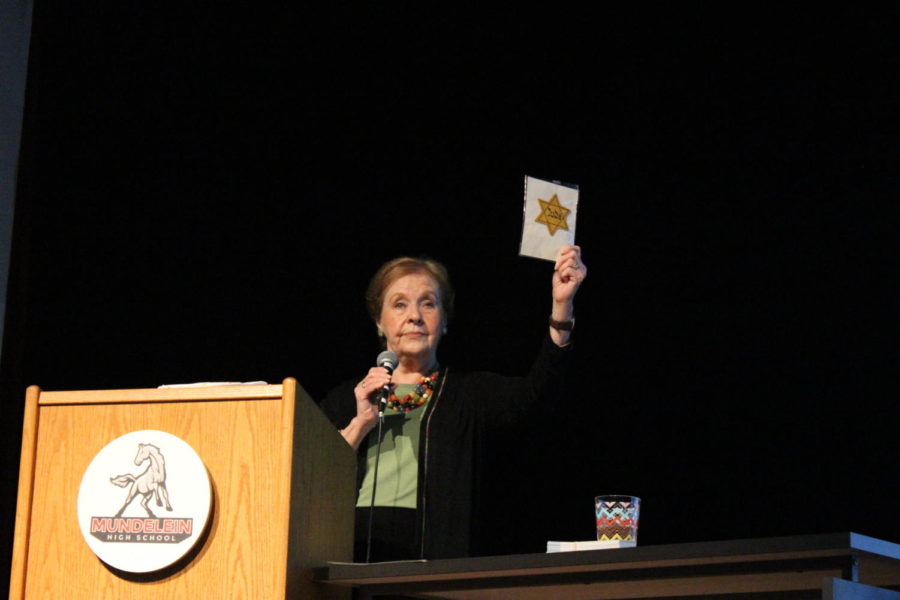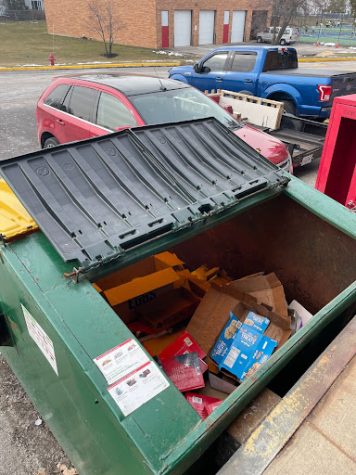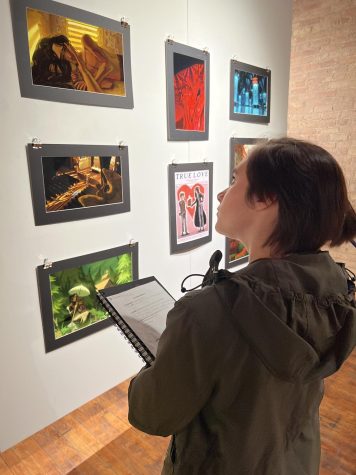Holocaust Survivor Touches Hearts With Inspiring Speech
December 20, 2017
Marion Blumenthal Lazan, a survivor of the Holocaust, told her gut-wrenching story to English students during third period on Monday, Dec. 11, in the school auditorium. The 90-minute speech had the auditorium in awe while the attendees not only listened but learned about her past of survival and strength.
Blumenthal Lazan said her life would’ve been the story that Anne Frank might have told if she had survived. Her memoir, “Four Perfect Pebbles,” is her first-hand account of the years she spent imprisoned at the Bergen-Belsen, a Nazi concentration camp.
Blumenthal Lazan was born in Germany, and she said her early life there was not that much different to the lives in modern-day America.
“Never did we think the anti-Semitic event would occur there,” Blumenthal Lazan said.
Her father worked at a shoe store beneath where she lived with her grandparents, mother, father and older brother.
“Life for Jews was getting increasingly more difficult,” said Blumenthal Lazan. “In 1935 the Nuremberg Laws were formulated and enforced.”
The Nuremberg Laws imposed many restraints on the Jewish people living in Germany. For example, Jews were unable to go to the theaters, parks or swimming pools. Jewish children could not go to the public schools.
“Non-Jews could not interact with Jews, and then the letter J was stamped on our ID card and passports. It felt as these restrictions went on and on,” said Blumenthal Lazan.
Blumenthal Lazan added that as these restrictions became more extreme, her parents chose to leave the country. Her family filed and received the necessary papers to leave the country.
Bu then happened “Nov. 9, 1938… Crystal Night, Night of Broken Glass, when the Nazis and their many followers smashed the windows and the store fronts of Jewish establishments,” Blumenthal Lazan reflected.
This night changed her whole youth as she knew it.
“In reality, this was the beginning of the Holocaust,” said Blumenthal Lazan.
Her father was the first to be sent to a concentration camp but was released shortly after because of their papers for immigration to America. Her family left for Holland on their way to America, but while in Holland, the Nazis invaded, and eventually the Blumenthal family was sent to the concentration camp.
Once her family arrived at its destination, she said the horror was ahead of her. They were “pulled and dragged” by the German guards and monitored by their attack dogs.
“To this day, I still feel a certain fear when I see a German Shepard,” said Blumenthal Lazan.
During the years in the concentration camp, she spent her time beside her mother on the female-side of camp where she witnessed the unimaginable. She saw dead bodies of those who had tried to escape hanging from the electric barbed wire fences. Wagons were filled with what she thought at first was firewood, only to realize they were filled with piles of dead bodies.
To cope with these horrors, Blumenthal Lazan created a game where she had to find four perfect pebbles, which represented her family members, and if she found the four perfect pebbles, that meant each of her family members would survive.
“It was a torturous, painful and very difficult game to play,” said Blumenthal Lazan.
However, her game allowed her to have the smallest bit of hope.
She lived in the overcrowded barracks until 1945 when her family was transferred to the Auschwitz camp in Eastern Europe. In route, they were liberated by Russian troops.
Blumenthal Lazan said she looks back at that time more as a nightmare, a dream, which allows her to separate herself from the events of her childhood.
Three years after her liberation, she and her mother and brother eventually arrived in Peoria.
During her speech to the students of MHS, Blumenthal Lazan commented on the trends she is seeing in current society.
“I am not scared by today’s news, but angry.” Blumenthal Lazan said.
Her major message to the audience was that we must be kind and respectful to one another.
“It was really moving,” said sophomore Katie Staroszczyk. “We don’t have much love in this world, and what we can take from this is that we need to spread love.”
In a one-on-one conversation after the speech, Blumenthal Lazan suggested the media contributes to the hate being spread in the world.
“You never see anything beautiful on the news,” she said. “There is so much beauty in this world, and we must share that.”
Blumenthal Lazan said she travels around the country talking with America’s youth to ensure that a dark time in history is never repeated.



